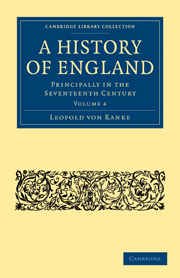Book contents
- Frontmatter
- Contents
- BOOK XVI THE LATER YEARS OF CHARLES II, 1675—1685 WHIGS AND TORIES
- BOOK XVII REIGN OF JAMES II, FEBRUARY 1685 TO SEPTEMBER 1688
- INTRODUCTION
- CHAP. I Accession of James II. First sittings of a new Parliament
- CHAP. II Repulse of the Refugees
- CHAP. III Later sittings of the Parliament
- CHAP. IV Declaration of the Right of Dispensation The Ecclesiastical Commission
- CHAP. V The King and William Penn. Declaration of Indulgence
- CHAP. VI Preparations for securing a Nonconformist Parliament
- CHAP. VII Trial of the Bishops. Further projects
- BOOK XVIII THE FALL OF JAMES II IN ITS CONNEXION WITH THE EUROPEAN CONFLICTS WHICH MARKED THE CLOSE OF 1688
- BOOK XIX COMPLETION OF THE REVOLUTION IN THE THREE KINGDOMS, 1688—1691
CHAP. III - Later sittings of the Parliament
Published online by Cambridge University Press: 07 September 2011
- Frontmatter
- Contents
- BOOK XVI THE LATER YEARS OF CHARLES II, 1675—1685 WHIGS AND TORIES
- BOOK XVII REIGN OF JAMES II, FEBRUARY 1685 TO SEPTEMBER 1688
- INTRODUCTION
- CHAP. I Accession of James II. First sittings of a new Parliament
- CHAP. II Repulse of the Refugees
- CHAP. III Later sittings of the Parliament
- CHAP. IV Declaration of the Right of Dispensation The Ecclesiastical Commission
- CHAP. V The King and William Penn. Declaration of Indulgence
- CHAP. VI Preparations for securing a Nonconformist Parliament
- CHAP. VII Trial of the Bishops. Further projects
- BOOK XVIII THE FALL OF JAMES II IN ITS CONNEXION WITH THE EUROPEAN CONFLICTS WHICH MARKED THE CLOSE OF 1688
- BOOK XIX COMPLETION OF THE REVOLUTION IN THE THREE KINGDOMS, 1688—1691
Summary
That the agitation aroused by the exiles did not spread further at this time was due in part to the withdrawal of the motion made, as before mentioned, for the rigorous enforcement of the Acts of Uniformity. That withdrawal had been partly prompted by consideration for the King, who saw in the motion a menace for his Catholic fellow-believers; but, in the case of many, consideration for the Protestant Dissenters, the moderate Presbyterians, whom it was not wished to irritate, had co-operated with this feeling; the rigour of the law would have struck both classes with equal force. King James felt little anxiety that the Presbyterians should be spared; he had only the Catholics in view, whom he had now quite decided not only to protect from continued oppression but to place on an equality with the adherents of the Episcopal Church. The submissiveness which the Parliament showed towards him, and the close connexion of interests on both sides which late events had brought to light, strengthened him in his hope of attaining his end with the help of the Parliament, especially as French support was at his disposal for this object. He said, ‘that to carry such laws in the Parliament as would authorise the course of conduct which he thought of following was just the object for which he needed French subsidies.’
- Type
- Chapter
- Information
- A History of EnglandPrincipally in the Seventeenth Century, pp. 264 - 280Publisher: Cambridge University PressPrint publication year: 2010First published in: 1875



